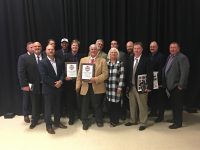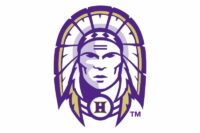Inductees
Hallsville High School Baseball Program

Just off Highway 63 in Boone County there’s a town called Hallsville. Yes, it has only one stoplight but, if you assume nothing is big here, you’d be wrong.
Baseball rules. Has for decades. In fact, over at the post office, a black-and-white framed photo hangs from the wall, depicting a town team in wool uniforms of the 1920s. The longtime baseball coach here found another over at the historical Morganthaler House, and also discovered that the 1955 club was coached by a young man still attending the University of Missouri.
The modern-day team has solidified it all, and its success is why the Missouri Sports Hall of Fame proudly inducted the Hallsville High School Baseball Program with the Class of 2019.
Led by coach Barry Koeneke (MSHOF 2019) since 1975, Hallsville has reached eight Final Fours, winning state championships in 1987, 2004 and 2005. The program placed third at the state tournament in 1983, 1984, 2013 and 2018. The Indians placed fourth in 2008.
Hallsville also has 16 district championships. The first was in 1962, and the rest covered the Final Four years as well as 1988, 1993, 1995, 1996, 2003, 2014 and 2017.
“The school district, K-12, is the centerpiece of the town,” Koeneke said, noting that baseball and basketball are near and dear to hearts in the community.
Look at it this way: Since 1955, the baseball program has seen 36 father-son combinations, and three grandfather-father-son combinations who have suited up for the Indians. Koeneke has coached 14 of the father-son duos.
From 1982 to 1990, Hallsville played in the district championship game. Another similar streak ran from 1993 to 1996.
Hallsville surged beginning in 1982. Its season-ending loss then fueled the 1983 team, which reached the program’s first Final Four behind pitchers Roy Merriott (4-1, 1.87 earned run average) and Mark Topash (5-1, 0.71 ERA), as well as David Topash and Scott Palmer (.457 avg.) A freshman, Dicky Pipes, earned the first of his four varsity letters that season, coming up from the JV late in the season and playing in a JV uniform because the team didn’t have any others. That team finished 10-2 in the state semifinals.
Several of those players helped the team return to the Final Four in 1984, but the next two seasons ended in heartbreak.
“I had kids crying that we couldn’t pull it off,” Koeneke said.
The 1987 state champs featured a strong group of seniors and three juniors. John Moore and Brian Topash were a combined 11-2 as pitchers, with the team earning a school-best 17 wins. Catcher Rob Davis hit a towering shot in the district championship, but the wind of an approaching storm pushed it back to shallow center field, allowing the game’s only run to score.
“We really had a good group in ’87, and that’s what really sparked this here,” Koeneke said.
The 2004 state championship team set a new program record with 24 wins, thanks in part to pitcher Matt Frevert. Frevert, who was 11-1 with a 1.34 ERA, later went on to a terrific career at Missouri State University and was drafted by the St. Louis Cardinals.
“We were kind of like a fine-tuned sports car,” Koeneke said.
A year later, Hallsville repeated as Class 2 state champions but it was a chore getting there, despite Frevert churning for a 0.99 ERA in 84 1/3 innings as a senior.
“They were a four-wheeler crew,” Koeneke said. “We had to get down in the dirt and we took off.”
The 2008 team was led by All-State pitcher Austin Church and fellow seniors Zack Koeneke, Tony McGee, Brandon Baker and Jake Hardin. That team won the district title, 1-0, on a squeeze play.
The 2003 team rode the arm of Brendan Beatty to the Final Four. His dad, Monte, was on the 1987 team.
The 2018 team included All-State shortstop Alex Wimer.
This for a program that produced 1993 Mizuno All-American catcher Ben Austene, 1995 All-State left-hander Chris Pemberton – the first lefty in Koeneke’s program – and 1999 All-State slugger Adam Rolfes.
All of this followed humble beginnings at the start of the Koeneke era. Back then, they played only a six-game schedule and did not have make-up games. But the 1980s changed the narrative.
“It comes down to community support, and they have wrapped their arms around baseball in particular,” Koeneke said. “We have great crowds both for home and road games, and it’s not just parents, either. It’s just been terrific.”

